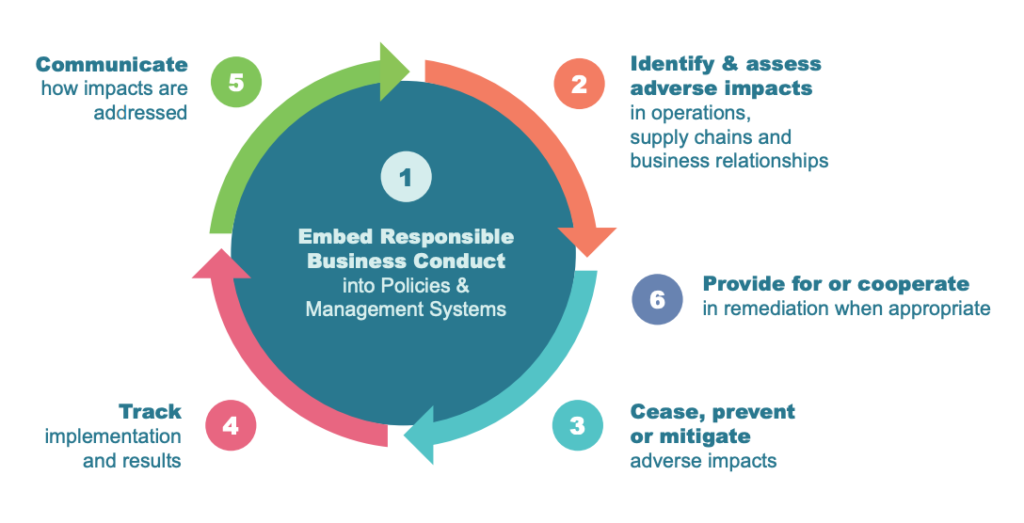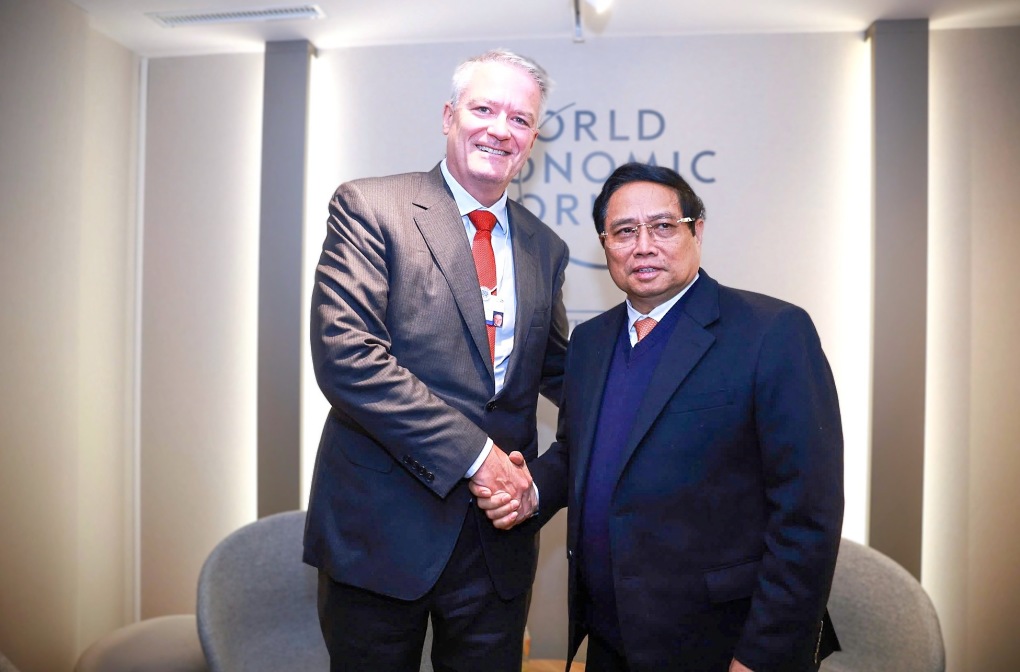Vietnam, the OECD, and responsible business conduct (RBC)
- 13/02/2025
- Posted by: Marijn
- Category: News

As the global economy keeps evolving, Vietnam is looking to strengthen its economic development and its international competitiveness. In this light, it was recently reported that Vietnam considers joining the Organisation for Economic Co-operation and Development (OECD). An important part of the OECD is its role in the development and the promotion of so – called “responsible business conduct” (RBC). The organization has issued several leading guidelines about this topic over the course of the past few decades. These are guidelines that Vietnam would need to adhere to, if it were indeed to become a member. Let’s have a closer look at the OECD, responsible business conduct, and what it means for Vietnam.
A brief introduction about the OECD
The Organisation for Economic Co-operation and Development (OECD) is an international organization. It is dedicated to fostering policies that improve the economic and social well-being of people worldwide. Established in 1961, the mission of the OECD is to establish evidence-based international standards, and to build better policies for better lives. By doing so, it contributes to promoting sustainable economic growth, enhancing employment, improving living standards, and maintaining financial stability. The organization provides a platform for governments to work together. For example on policy solutions for pressing global challenges, such as: climate change, inequality, and digital transformation.
With 38 member countries, the OECD includes many of the world’s largest economies, such as: America, Canada, Australia, Japan, Germany, France, and the United Kingdom. However it also engages non-member countries in various collaborative initiatives. In Southeast Asia, for example, the OECD works closely with countries such as: Indonesia, Malaysia, Thailand, and the Philippines. Since last year 2024, the organization has adopted so – called “roadmaps for accession” for Indonesia and Thailand. Among other things, the OECD supports these countries’ efforts to implement best practices in governance, economic development, and environmental sustainability.
Vietnam, of course being another emerging economy in Southeast Asia, has recently shown interest in becoming an OECD member. More specifically, Vietnam’s Prime Minister met with the Secretary General of the OECD at the recent World Economic Forum in Davos. Among other things, he emphasized Vietnam’s interest in learning from OECD’s experiences and policy recommendations. In order to enhance Vietnam’s competitiveness, and to align with global governance standards. Furthermore, he requested OECD’s support in helping Vietnam to meet the organization’s standards and procedures for membership, as well as facilitating the participation of Vietnamese experts in the OECD Secretariat.

Responsible business conduct (RBC)
An important part of global governance standards is the so – called “responsible business conduct”, often abbreviated as “RBC”. This is a very important topic, which is currently a lot in the news, especially with regard to new EU regulations in this field. However, the foundations for RBC were already laid some 49 years ago. In 1976, the OECD Guidelines for Multinational Enterprises (MNE Guidelines) introduced responsible business conduct. Its main aim was to position people, planet and society at the heart of business operations. According to the OECD itself, responsible business conduct refers to businesses acting in ways that respect human rights, labor standards, the environment, and anti-corruption measures. It seeks to ensure that economic development does not come at the expense of social or environmental stability.
The concept of RBC has been picked up by various other organizations, and it has developed considerably since those early days in 1976. For example, the concept is closely related to newer concepts such as “environment, social, and governance” (ESG), and the United Nations sustainable development goals (SDG). What all these concepts have in common is that they focus on sustainable development. Furthermore, they try to strike a balance between business profitability and positive societal impact. By adopting RBC principles, Vietnam can align itself with international standards for responsible governance, transparency, and sustainable development. This may benefit both its economy and its society as a whole.

The growing need for RBC in Vietnam
Vietnam’s rapid economic growth over the past few decades has increased living standards in Vietnam considerably. It has also transformed the country into one of the world’s fastest-growing economies. However, this remarkable progress has also brought along challenges that need to be addressed. For example, environmental degradation, labor exploitation, and insufficient corporate transparency have become critical issues in industries such as manufacturing, agriculture, and energy production.
At present, businesses in Vietnam are mostly focused on maximizing profits with relatively limited regard for the long-term consequences on their workers, communities, or the environment. This short-term outlook can unfortunately lead to detrimental outcomes, including inequality, ecological damage, and less trust from international partners. It is fair to say that if Vietnam continues its current development trajectory, it would be good to focus more on sustainable, ethical, and transparent business practices.
RBC offers a solution by setting frameworks that encourage businesses to think beyond profits, and to consider their broader impacts. This does not only create obligations, but in fact it could also create many opportunities. Indeed, the inclusion of RBC practices can elevate Vietnam’s competitive advantage in global markets by attracting ethical investors and fostering more resilient industries. This move will also align Vietnam with the growing global demand for sustainable practices. Because more and more multinational companies nowadays seek partners who comply with international environmental, social, and governance (ESG) standards.

How RBC may drive Vietnam’s development
1. Improved social standards and labor rights
One of the central components of RBC is respecting labor rights and ensuring fair treatment of workers. Vietnam is home to a vibrant workforce, but challenges such as low wages, poor working conditions, sometimes unsafe working places, and labor exploitation do exist in some sectors. By incorporating RBC into its national policies and business practices, Vietnam may improve its labor laws, raise the standard of living for its workforce, and ultimately create a more productive and equitable society.
Companies operating in Vietnam may integrate RBC by adhering to international labor standards, such as those set by the International Labour Organization (ILO). This means, among other things, offering fair wages, safe working conditions, and opportunities for worker participation. Additionally, addressing gender equality, providing skills training, and promoting decent work are important aspects of developing a strong labor market. A market that empowers workers, while ensuring that businesses can still thrive.
2. Sustainable environmental practices
As one of the world’s fastest-growing economies, Vietnam unfortunately faces significant environmental challenges. Deforestation, pollution, and overexploitation of natural resources are urgent issues, especially in the manufacturing, agriculture, and energy sectors. These environmental issues threaten Vietnam’s long-term development and undermine the country’s ecological sustainability.
RBC may help mitigate these risks by encouraging businesses to adopt sustainable practices, reduce their carbon footprints, and responsibly manage natural resources. Incorporating green technologies, improving waste management systems, and investing in renewable energy may ensure that Vietnam’s industries remain competitive while protecting the environment. Moreover, international partners increasingly demand sustainable supply chains. Meaning that businesses that embrace RBC will be better positioned for long-term growth and international partnerships.
3. International trade and investment
As Vietnam strives to integrate further into the global economy, RBC can act as a magnet for international trade and investment. Investors, particularly those from the OECD countries, are placing greater emphasis on sustainability, social responsibility, and good governance. In order to attract these investors, Vietnam would do good to align its business practices with international RBC frameworks, such as the OECD Guidelines for Multinational Enterprises.
With a commitment to RBC, Vietnam can create an environment where foreign investors feel more confident about their investments, knowing that businesses in the market will comply with responsible standards. In a way, RBC may help to create a so – called “level playing field” for businesses. Additionally, RBC principles can help Vietnam access international markets that are increasingly regulated for sustainability and human rights concerns. One key example is the European Union, which in several ways is among the frontrunners in the field of RBC.

The global transition to sustainability
By adopting RBC, Vietnam can not only improve its own development but also contribute to global sustainability. The country’s role in the international community is growing as it becomes an important player in the Southeast Asian region. Being an emerging economy, Vietnam has the opportunity to set an example for other developing nations, demonstrating that it is possible to combine economic growth with social responsibility and environmental sustainability. Indeed, Vietnam’s journey towards RBC integration could inspire other nations in the region to adopt similar frameworks. By promoting RBC, Vietnam may position itself as a frontrunner in the global transition to a sustainable future. One that balances economic growth with social development and protection of the environment.

Conclusion
Vietnam’s ambition to join the OECD, and the consequential adherence to RBC, could be an important step towards ensuring long-term, sustainable development for the country. By embedding RBC principles across several industries, the country can improve social conditions, protect the environment, increase corporate transparency, while at the same time attract more investment. And in doing so, Vietnam may not only improve its own future, but also contribute to the global pursuit of sustainability. The adoption of RBC in Vietnam offers a chance to harmonize economic growth with the well-being of people and the planet.
VNHL is here to support you
VNHL fully appreciates and supports the OECD guidelines on responsible business conduct, as well as the United Nations sustainable development goals. We believe these are very important topics, both for the development of Vietnam, but also for the world in general. We therefore closely follow any new developments in this field. If you have any questions or requests for support: you can reach out to us via our contact us page. Our three main services are: (i) consulting, (ii) networking, and (iii) supporting. We look forward to hearing from you and to supporting you.

*Dear reader, even though our VNHL Consulting team always tries its very best to provide its Clients with correct and complete info: we are not a Vietnamese law firm. The information in this post is therefore not meant to, and should also not be construed to, constitute legal advice. For specialized advice in the fields of law, accounting, tax, etcetera: we always recommend our Clients to speak with qualified specialists in those fields. We have several such specialists in our nationwide network, and we are always happy to introduce our Clients to them, when appreciated.


[…] on a topic that is related to sustainability. May it be about the UN Sustainability Goals, or about Responsible Business Conduct: these topics are close to our heart. If you have any ideas, plans, or questions: do not hesitate […]
[…] should also be surrounded by green spaces to reduce the impact on nearby communities. Furthermore, responsible business conduct (RBC) may also play a role […]
[…] On 23 April 2025, at a high-stakes virtual summit on climate action, Vietnam’s Prime Minister Pham Minh Chinh declared that the green transition is no longer optional. Instead, it is an inevitable path and a strategic national priority. Within his statement, the Prime Minister emphasized that the green economy must serve both environmental and economic objectives, ensuring prosperity for future generations while protecting the planet. The Government confirmed Vietnam’s commitment to achieving net-zero emissions by 2050, aligning its policies with global climate goals. Vietnam’s approach follows a people-centered philosophy, focusing on sustainable development that benefits every citizen, not just economic elites. If you are interested in these topics, we recently wrote two articles about sustainability in the Mekong Delta, and about responsible business conduct. […]